Capstone Project: Legal/Regulatory Issues in Canadian Travel Industry
VerifiedAdded on 2022/08/17
|6
|1732
|12
Report
AI Summary
This capstone project report offers a comprehensive overview of the Canadian travel industry, focusing on the legal, governmental, and regulatory constraints that shape its competitive environment. The report delves into key issues, including the role of TICO (Travel Industry Council of Ontario) regulations, the impact of travel restrictions (particularly those related to the coronavirus pandemic), and the financial burdens imposed by the Travel Industry Act. It examines how these factors influence the growth of travel agencies and the overall industry. The report also analyzes the effects of government taxation on travel services and tourism products, assessing their impact on the industry's global competitiveness. Furthermore, it explores the implications of heavy travel restrictions imposed on citizens, the role of the Canadian travel advisory, and the importance of regulatory compliance. The report concludes by emphasizing the significance of these issues and their implications for the industry's future development. References from various sources are included to support the findings.
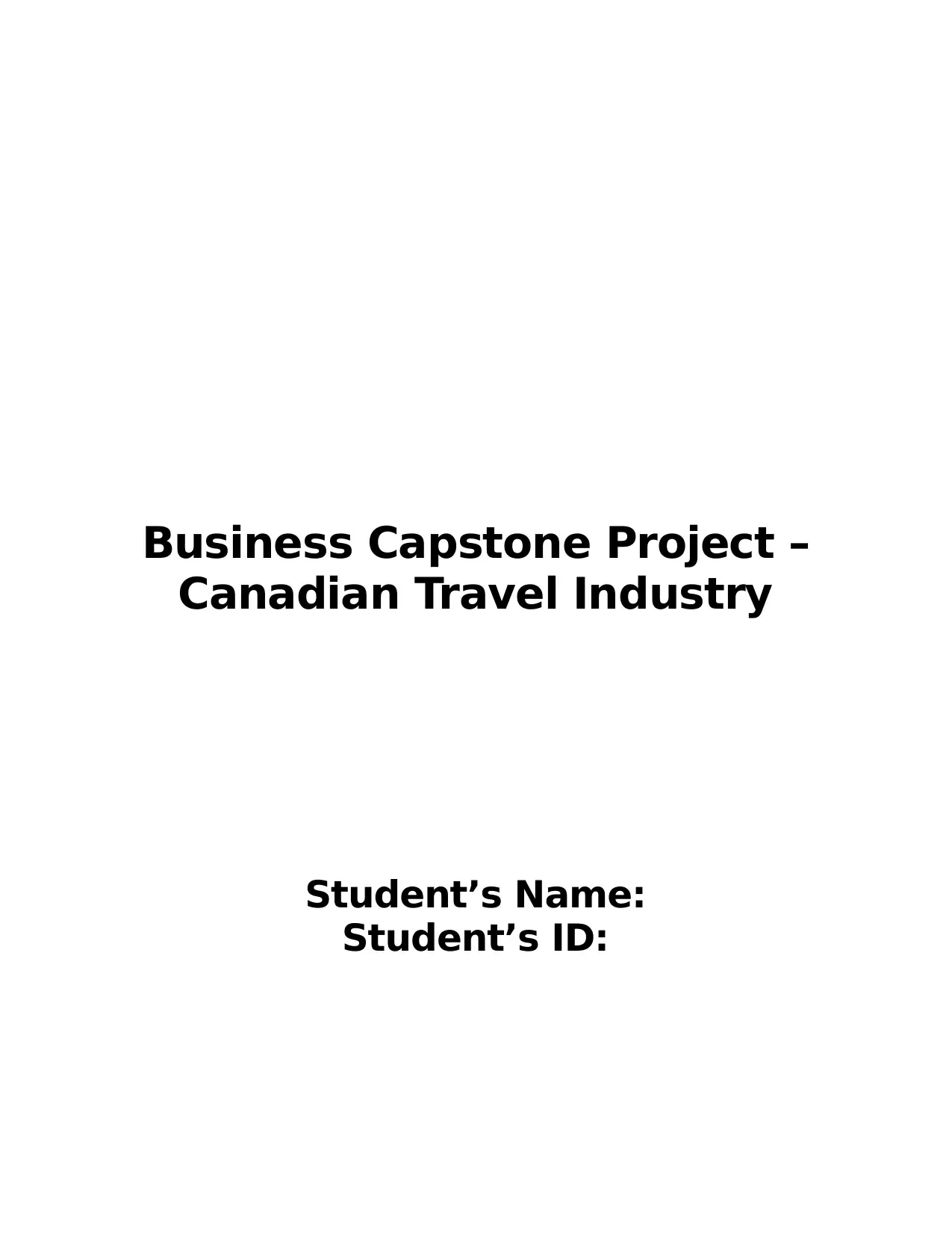
Business Capstone Project –
Canadian Travel Industry
Student’s Name:
Student’s ID:
Canadian Travel Industry
Student’s Name:
Student’s ID:
Paraphrase This Document
Need a fresh take? Get an instant paraphrase of this document with our AI Paraphraser
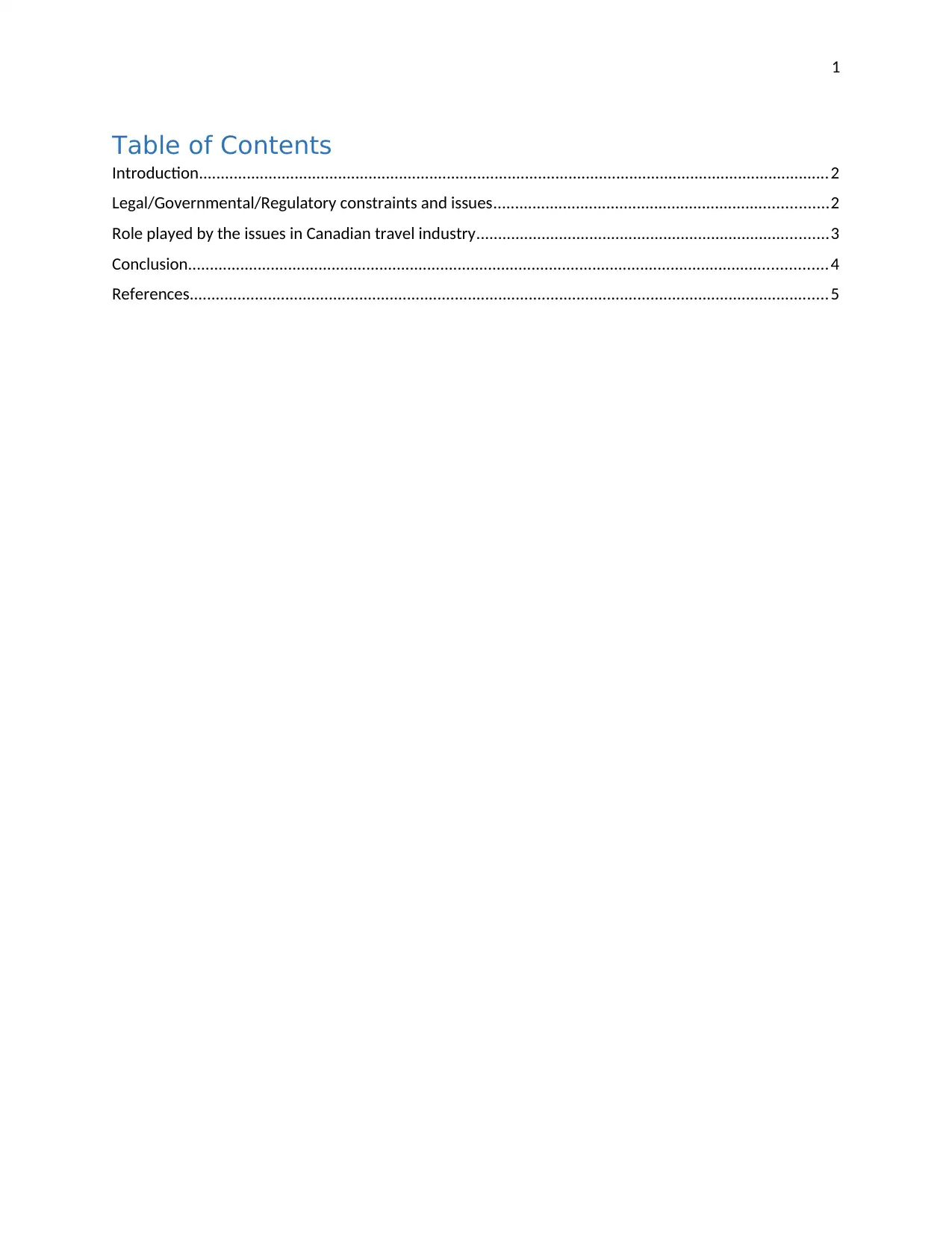
1
Table of Contents
Introduction.................................................................................................................................................2
Legal/Governmental/Regulatory constraints and issues.............................................................................2
Role played by the issues in Canadian travel industry.................................................................................3
Conclusion...................................................................................................................................................4
References...................................................................................................................................................5
Table of Contents
Introduction.................................................................................................................................................2
Legal/Governmental/Regulatory constraints and issues.............................................................................2
Role played by the issues in Canadian travel industry.................................................................................3
Conclusion...................................................................................................................................................4
References...................................................................................................................................................5
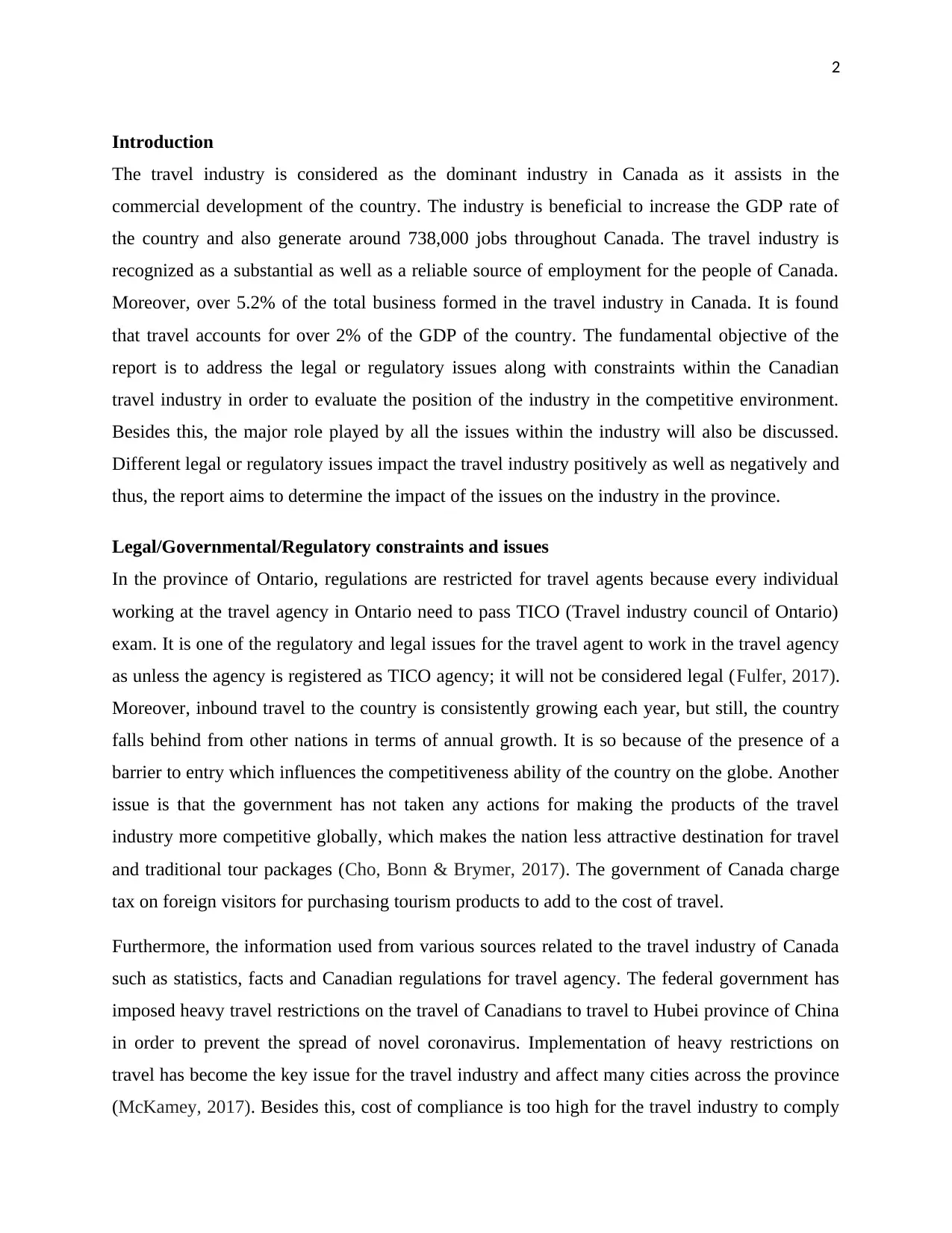
2
Introduction
The travel industry is considered as the dominant industry in Canada as it assists in the
commercial development of the country. The industry is beneficial to increase the GDP rate of
the country and also generate around 738,000 jobs throughout Canada. The travel industry is
recognized as a substantial as well as a reliable source of employment for the people of Canada.
Moreover, over 5.2% of the total business formed in the travel industry in Canada. It is found
that travel accounts for over 2% of the GDP of the country. The fundamental objective of the
report is to address the legal or regulatory issues along with constraints within the Canadian
travel industry in order to evaluate the position of the industry in the competitive environment.
Besides this, the major role played by all the issues within the industry will also be discussed.
Different legal or regulatory issues impact the travel industry positively as well as negatively and
thus, the report aims to determine the impact of the issues on the industry in the province.
Legal/Governmental/Regulatory constraints and issues
In the province of Ontario, regulations are restricted for travel agents because every individual
working at the travel agency in Ontario need to pass TICO (Travel industry council of Ontario)
exam. It is one of the regulatory and legal issues for the travel agent to work in the travel agency
as unless the agency is registered as TICO agency; it will not be considered legal (Fulfer, 2017).
Moreover, inbound travel to the country is consistently growing each year, but still, the country
falls behind from other nations in terms of annual growth. It is so because of the presence of a
barrier to entry which influences the competitiveness ability of the country on the globe. Another
issue is that the government has not taken any actions for making the products of the travel
industry more competitive globally, which makes the nation less attractive destination for travel
and traditional tour packages (Cho, Bonn & Brymer, 2017). The government of Canada charge
tax on foreign visitors for purchasing tourism products to add to the cost of travel.
Furthermore, the information used from various sources related to the travel industry of Canada
such as statistics, facts and Canadian regulations for travel agency. The federal government has
imposed heavy travel restrictions on the travel of Canadians to travel to Hubei province of China
in order to prevent the spread of novel coronavirus. Implementation of heavy restrictions on
travel has become the key issue for the travel industry and affect many cities across the province
(McKamey, 2017). Besides this, cost of compliance is too high for the travel industry to comply
Introduction
The travel industry is considered as the dominant industry in Canada as it assists in the
commercial development of the country. The industry is beneficial to increase the GDP rate of
the country and also generate around 738,000 jobs throughout Canada. The travel industry is
recognized as a substantial as well as a reliable source of employment for the people of Canada.
Moreover, over 5.2% of the total business formed in the travel industry in Canada. It is found
that travel accounts for over 2% of the GDP of the country. The fundamental objective of the
report is to address the legal or regulatory issues along with constraints within the Canadian
travel industry in order to evaluate the position of the industry in the competitive environment.
Besides this, the major role played by all the issues within the industry will also be discussed.
Different legal or regulatory issues impact the travel industry positively as well as negatively and
thus, the report aims to determine the impact of the issues on the industry in the province.
Legal/Governmental/Regulatory constraints and issues
In the province of Ontario, regulations are restricted for travel agents because every individual
working at the travel agency in Ontario need to pass TICO (Travel industry council of Ontario)
exam. It is one of the regulatory and legal issues for the travel agent to work in the travel agency
as unless the agency is registered as TICO agency; it will not be considered legal (Fulfer, 2017).
Moreover, inbound travel to the country is consistently growing each year, but still, the country
falls behind from other nations in terms of annual growth. It is so because of the presence of a
barrier to entry which influences the competitiveness ability of the country on the globe. Another
issue is that the government has not taken any actions for making the products of the travel
industry more competitive globally, which makes the nation less attractive destination for travel
and traditional tour packages (Cho, Bonn & Brymer, 2017). The government of Canada charge
tax on foreign visitors for purchasing tourism products to add to the cost of travel.
Furthermore, the information used from various sources related to the travel industry of Canada
such as statistics, facts and Canadian regulations for travel agency. The federal government has
imposed heavy travel restrictions on the travel of Canadians to travel to Hubei province of China
in order to prevent the spread of novel coronavirus. Implementation of heavy restrictions on
travel has become the key issue for the travel industry and affect many cities across the province
(McKamey, 2017). Besides this, cost of compliance is too high for the travel industry to comply
⊘ This is a preview!⊘
Do you want full access?
Subscribe today to unlock all pages.

Trusted by 1+ million students worldwide
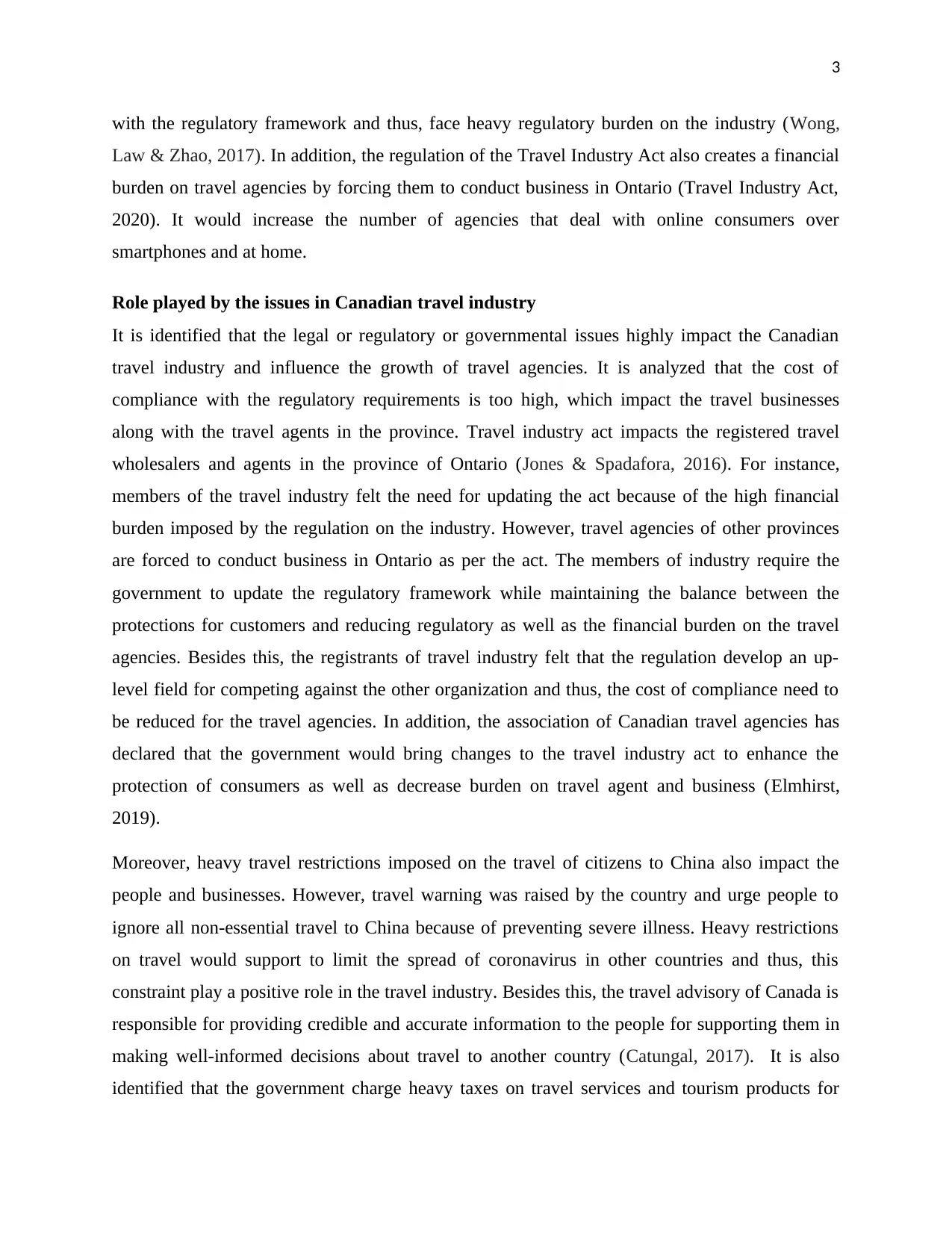
3
with the regulatory framework and thus, face heavy regulatory burden on the industry (Wong,
Law & Zhao, 2017). In addition, the regulation of the Travel Industry Act also creates a financial
burden on travel agencies by forcing them to conduct business in Ontario (Travel Industry Act,
2020). It would increase the number of agencies that deal with online consumers over
smartphones and at home.
Role played by the issues in Canadian travel industry
It is identified that the legal or regulatory or governmental issues highly impact the Canadian
travel industry and influence the growth of travel agencies. It is analyzed that the cost of
compliance with the regulatory requirements is too high, which impact the travel businesses
along with the travel agents in the province. Travel industry act impacts the registered travel
wholesalers and agents in the province of Ontario (Jones & Spadafora, 2016). For instance,
members of the travel industry felt the need for updating the act because of the high financial
burden imposed by the regulation on the industry. However, travel agencies of other provinces
are forced to conduct business in Ontario as per the act. The members of industry require the
government to update the regulatory framework while maintaining the balance between the
protections for customers and reducing regulatory as well as the financial burden on the travel
agencies. Besides this, the registrants of travel industry felt that the regulation develop an up-
level field for competing against the other organization and thus, the cost of compliance need to
be reduced for the travel agencies. In addition, the association of Canadian travel agencies has
declared that the government would bring changes to the travel industry act to enhance the
protection of consumers as well as decrease burden on travel agent and business (Elmhirst,
2019).
Moreover, heavy travel restrictions imposed on the travel of citizens to China also impact the
people and businesses. However, travel warning was raised by the country and urge people to
ignore all non-essential travel to China because of preventing severe illness. Heavy restrictions
on travel would support to limit the spread of coronavirus in other countries and thus, this
constraint play a positive role in the travel industry. Besides this, the travel advisory of Canada is
responsible for providing credible and accurate information to the people for supporting them in
making well-informed decisions about travel to another country (Catungal, 2017). It is also
identified that the government charge heavy taxes on travel services and tourism products for
with the regulatory framework and thus, face heavy regulatory burden on the industry (Wong,
Law & Zhao, 2017). In addition, the regulation of the Travel Industry Act also creates a financial
burden on travel agencies by forcing them to conduct business in Ontario (Travel Industry Act,
2020). It would increase the number of agencies that deal with online consumers over
smartphones and at home.
Role played by the issues in Canadian travel industry
It is identified that the legal or regulatory or governmental issues highly impact the Canadian
travel industry and influence the growth of travel agencies. It is analyzed that the cost of
compliance with the regulatory requirements is too high, which impact the travel businesses
along with the travel agents in the province. Travel industry act impacts the registered travel
wholesalers and agents in the province of Ontario (Jones & Spadafora, 2016). For instance,
members of the travel industry felt the need for updating the act because of the high financial
burden imposed by the regulation on the industry. However, travel agencies of other provinces
are forced to conduct business in Ontario as per the act. The members of industry require the
government to update the regulatory framework while maintaining the balance between the
protections for customers and reducing regulatory as well as the financial burden on the travel
agencies. Besides this, the registrants of travel industry felt that the regulation develop an up-
level field for competing against the other organization and thus, the cost of compliance need to
be reduced for the travel agencies. In addition, the association of Canadian travel agencies has
declared that the government would bring changes to the travel industry act to enhance the
protection of consumers as well as decrease burden on travel agent and business (Elmhirst,
2019).
Moreover, heavy travel restrictions imposed on the travel of citizens to China also impact the
people and businesses. However, travel warning was raised by the country and urge people to
ignore all non-essential travel to China because of preventing severe illness. Heavy restrictions
on travel would support to limit the spread of coronavirus in other countries and thus, this
constraint play a positive role in the travel industry. Besides this, the travel advisory of Canada is
responsible for providing credible and accurate information to the people for supporting them in
making well-informed decisions about travel to another country (Catungal, 2017). It is also
identified that the government charge heavy taxes on travel services and tourism products for
Paraphrase This Document
Need a fresh take? Get an instant paraphrase of this document with our AI Paraphraser
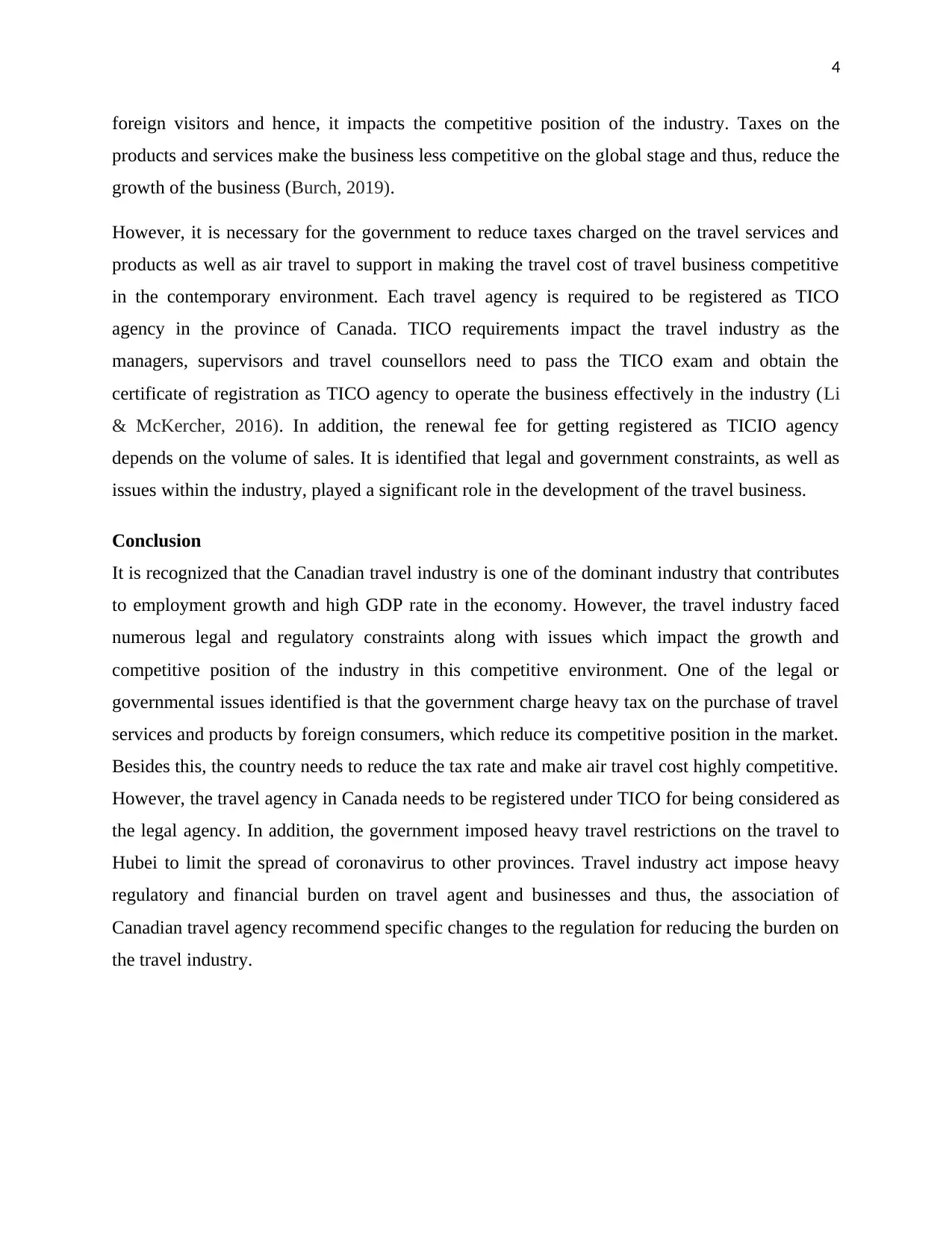
4
foreign visitors and hence, it impacts the competitive position of the industry. Taxes on the
products and services make the business less competitive on the global stage and thus, reduce the
growth of the business (Burch, 2019).
However, it is necessary for the government to reduce taxes charged on the travel services and
products as well as air travel to support in making the travel cost of travel business competitive
in the contemporary environment. Each travel agency is required to be registered as TICO
agency in the province of Canada. TICO requirements impact the travel industry as the
managers, supervisors and travel counsellors need to pass the TICO exam and obtain the
certificate of registration as TICO agency to operate the business effectively in the industry (Li
& McKercher, 2016). In addition, the renewal fee for getting registered as TICIO agency
depends on the volume of sales. It is identified that legal and government constraints, as well as
issues within the industry, played a significant role in the development of the travel business.
Conclusion
It is recognized that the Canadian travel industry is one of the dominant industry that contributes
to employment growth and high GDP rate in the economy. However, the travel industry faced
numerous legal and regulatory constraints along with issues which impact the growth and
competitive position of the industry in this competitive environment. One of the legal or
governmental issues identified is that the government charge heavy tax on the purchase of travel
services and products by foreign consumers, which reduce its competitive position in the market.
Besides this, the country needs to reduce the tax rate and make air travel cost highly competitive.
However, the travel agency in Canada needs to be registered under TICO for being considered as
the legal agency. In addition, the government imposed heavy travel restrictions on the travel to
Hubei to limit the spread of coronavirus to other provinces. Travel industry act impose heavy
regulatory and financial burden on travel agent and businesses and thus, the association of
Canadian travel agency recommend specific changes to the regulation for reducing the burden on
the travel industry.
foreign visitors and hence, it impacts the competitive position of the industry. Taxes on the
products and services make the business less competitive on the global stage and thus, reduce the
growth of the business (Burch, 2019).
However, it is necessary for the government to reduce taxes charged on the travel services and
products as well as air travel to support in making the travel cost of travel business competitive
in the contemporary environment. Each travel agency is required to be registered as TICO
agency in the province of Canada. TICO requirements impact the travel industry as the
managers, supervisors and travel counsellors need to pass the TICO exam and obtain the
certificate of registration as TICO agency to operate the business effectively in the industry (Li
& McKercher, 2016). In addition, the renewal fee for getting registered as TICIO agency
depends on the volume of sales. It is identified that legal and government constraints, as well as
issues within the industry, played a significant role in the development of the travel business.
Conclusion
It is recognized that the Canadian travel industry is one of the dominant industry that contributes
to employment growth and high GDP rate in the economy. However, the travel industry faced
numerous legal and regulatory constraints along with issues which impact the growth and
competitive position of the industry in this competitive environment. One of the legal or
governmental issues identified is that the government charge heavy tax on the purchase of travel
services and products by foreign consumers, which reduce its competitive position in the market.
Besides this, the country needs to reduce the tax rate and make air travel cost highly competitive.
However, the travel agency in Canada needs to be registered under TICO for being considered as
the legal agency. In addition, the government imposed heavy travel restrictions on the travel to
Hubei to limit the spread of coronavirus to other provinces. Travel industry act impose heavy
regulatory and financial burden on travel agent and businesses and thus, the association of
Canadian travel agency recommend specific changes to the regulation for reducing the burden on
the travel industry.
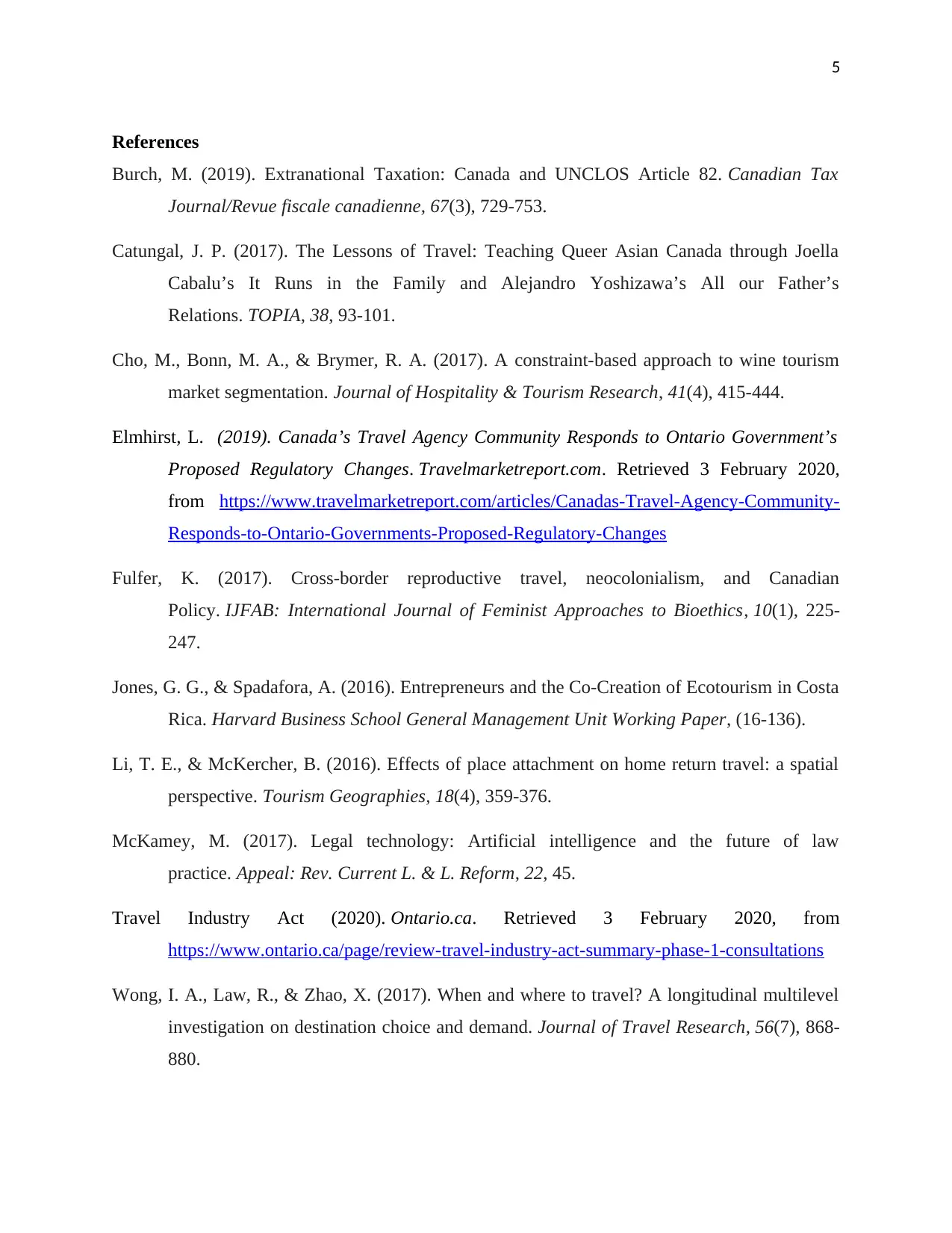
5
References
Burch, M. (2019). Extranational Taxation: Canada and UNCLOS Article 82. Canadian Tax
Journal/Revue fiscale canadienne, 67(3), 729-753.
Catungal, J. P. (2017). The Lessons of Travel: Teaching Queer Asian Canada through Joella
Cabalu’s It Runs in the Family and Alejandro Yoshizawa’s All our Father’s
Relations. TOPIA, 38, 93-101.
Cho, M., Bonn, M. A., & Brymer, R. A. (2017). A constraint-based approach to wine tourism
market segmentation. Journal of Hospitality & Tourism Research, 41(4), 415-444.
Elmhirst, L. (2019). Canada’s Travel Agency Community Responds to Ontario Government’s
Proposed Regulatory Changes. Travelmarketreport.com. Retrieved 3 February 2020,
from https://www.travelmarketreport.com/articles/Canadas-Travel-Agency-Community-
Responds-to-Ontario-Governments-Proposed-Regulatory-Changes
Fulfer, K. (2017). Cross-border reproductive travel, neocolonialism, and Canadian
Policy. IJFAB: International Journal of Feminist Approaches to Bioethics, 10(1), 225-
247.
Jones, G. G., & Spadafora, A. (2016). Entrepreneurs and the Co-Creation of Ecotourism in Costa
Rica. Harvard Business School General Management Unit Working Paper, (16-136).
Li, T. E., & McKercher, B. (2016). Effects of place attachment on home return travel: a spatial
perspective. Tourism Geographies, 18(4), 359-376.
McKamey, M. (2017). Legal technology: Artificial intelligence and the future of law
practice. Appeal: Rev. Current L. & L. Reform, 22, 45.
Travel Industry Act (2020). Ontario.ca. Retrieved 3 February 2020, from
https://www.ontario.ca/page/review-travel-industry-act-summary-phase-1-consultations
Wong, I. A., Law, R., & Zhao, X. (2017). When and where to travel? A longitudinal multilevel
investigation on destination choice and demand. Journal of Travel Research, 56(7), 868-
880.
References
Burch, M. (2019). Extranational Taxation: Canada and UNCLOS Article 82. Canadian Tax
Journal/Revue fiscale canadienne, 67(3), 729-753.
Catungal, J. P. (2017). The Lessons of Travel: Teaching Queer Asian Canada through Joella
Cabalu’s It Runs in the Family and Alejandro Yoshizawa’s All our Father’s
Relations. TOPIA, 38, 93-101.
Cho, M., Bonn, M. A., & Brymer, R. A. (2017). A constraint-based approach to wine tourism
market segmentation. Journal of Hospitality & Tourism Research, 41(4), 415-444.
Elmhirst, L. (2019). Canada’s Travel Agency Community Responds to Ontario Government’s
Proposed Regulatory Changes. Travelmarketreport.com. Retrieved 3 February 2020,
from https://www.travelmarketreport.com/articles/Canadas-Travel-Agency-Community-
Responds-to-Ontario-Governments-Proposed-Regulatory-Changes
Fulfer, K. (2017). Cross-border reproductive travel, neocolonialism, and Canadian
Policy. IJFAB: International Journal of Feminist Approaches to Bioethics, 10(1), 225-
247.
Jones, G. G., & Spadafora, A. (2016). Entrepreneurs and the Co-Creation of Ecotourism in Costa
Rica. Harvard Business School General Management Unit Working Paper, (16-136).
Li, T. E., & McKercher, B. (2016). Effects of place attachment on home return travel: a spatial
perspective. Tourism Geographies, 18(4), 359-376.
McKamey, M. (2017). Legal technology: Artificial intelligence and the future of law
practice. Appeal: Rev. Current L. & L. Reform, 22, 45.
Travel Industry Act (2020). Ontario.ca. Retrieved 3 February 2020, from
https://www.ontario.ca/page/review-travel-industry-act-summary-phase-1-consultations
Wong, I. A., Law, R., & Zhao, X. (2017). When and where to travel? A longitudinal multilevel
investigation on destination choice and demand. Journal of Travel Research, 56(7), 868-
880.
⊘ This is a preview!⊘
Do you want full access?
Subscribe today to unlock all pages.

Trusted by 1+ million students worldwide
1 out of 6
Related Documents
Your All-in-One AI-Powered Toolkit for Academic Success.
+13062052269
info@desklib.com
Available 24*7 on WhatsApp / Email
![[object Object]](/_next/static/media/star-bottom.7253800d.svg)
Unlock your academic potential
Copyright © 2020–2025 A2Z Services. All Rights Reserved. Developed and managed by ZUCOL.




